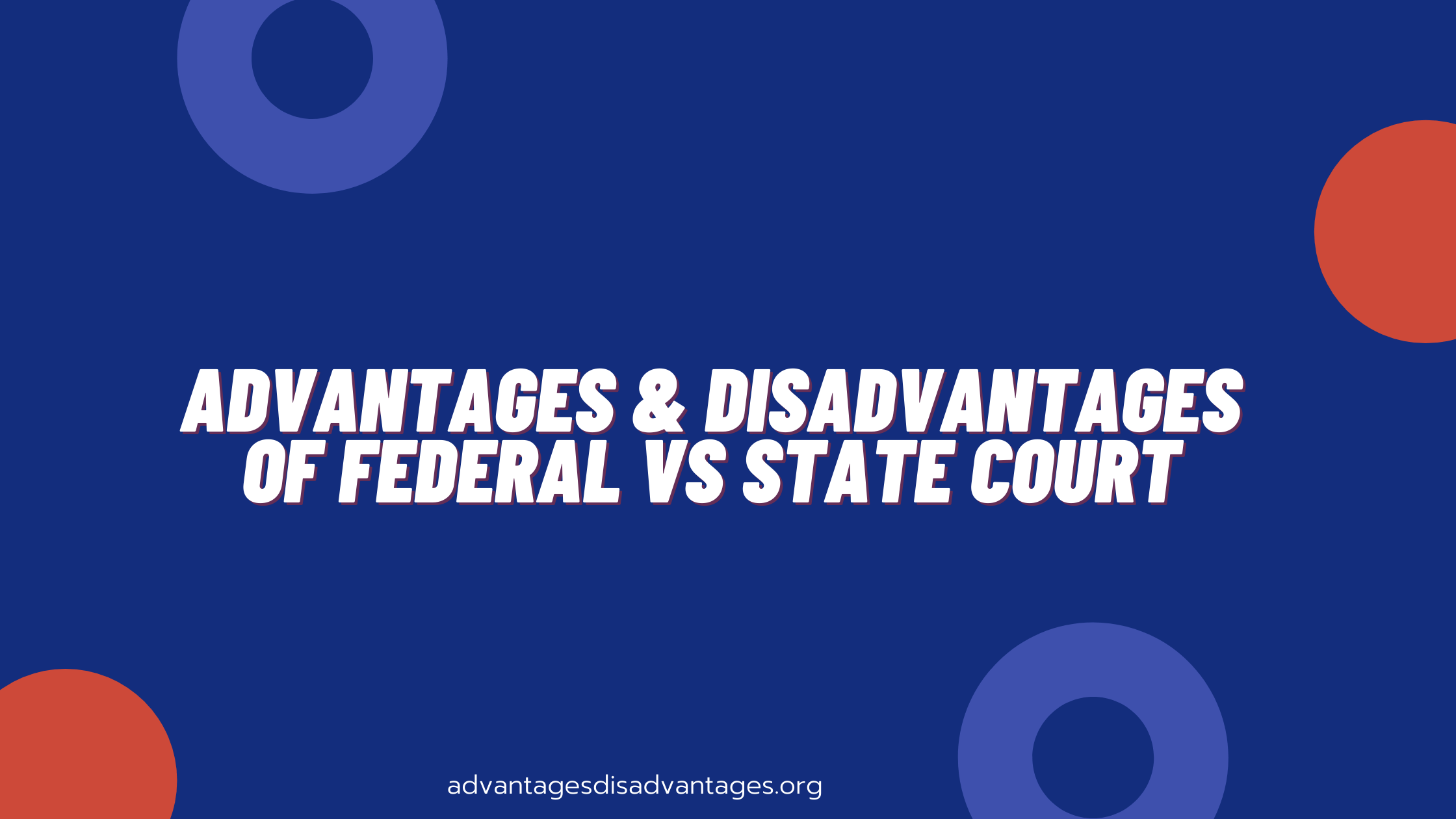Introduction:
In the United States, there are two court systems: federal and state. Each system has its own set of laws, judges, and procedures. While both systems are designed to uphold the law and ensure justice, there are distinct advantages and disadvantages to each. This article will explore the advantages and disadvantages of the federal versus state court system.
Advantages of the Federal Court System
The federal court system has several advantages over the state court system. Firstly, it offers a unified system of laws that are applied uniformly across the entire country. This means that federal court decisions are binding on all states, which ensures that everyone is held to the same legal standard.
Another advantage of the federal court system is that it has a high degree of expertise in certain areas of law, such as patent law, antitrust law, and securities law. This is because the federal courts have jurisdiction over cases that involve federal law, which often deals with complex and technical issues that are not as prevalent in state law.
Finally, the federal court system offers greater protections for individual rights. This is because the U.S. Constitution is the highest law in the land, and the federal courts are tasked with interpreting and enforcing it. This means that federal courts are often the venue of choice for individuals who feel their constitutional rights have been violated.
Disadvantages of the Federal Court System
While the federal court system has many advantages, it also has some disadvantages. One of the biggest disadvantages is that federal court cases can be expensive and time-consuming. This is because the federal court system has a higher level of complexity and requires more resources than the state court system.
Another disadvantage is that the federal court system can be less accessible to individuals who live in rural areas or who are unable to travel long distances to attend court hearings. This is because the federal courts are typically located in major cities, and it can be difficult for individuals who live far away to attend hearings or access legal services.

Advantages of the State Court System
The state court system also has several advantages over the federal court system. Firstly, it is more accessible to individuals who live in rural areas or who are unable to travel long distances to attend court hearings. This is because the state courts are typically located within the state, and it is often easier for individuals to access legal services and attend hearings.
Another advantage of the state court system is that it is often less expensive and less time-consuming than the federal court system. This is because state court cases tend to be less complex and require fewer resources than federal court cases.
Finally, the state court system has a better understanding of local issues and concerns. This is because the state courts are tasked with interpreting and enforcing state law, which often deals with issues that are specific to the state or local community.
Disadvantages of the State Court System
While the state court system has many advantages, it also has some disadvantages. One of the biggest disadvantages is that state courts can sometimes be biased towards local interests or political affiliations. This is because state judges are often elected or appointed based on their political beliefs or connections, which can lead to decisions that favor certain groups or individuals.
Another disadvantage of the state court system is that it can be less effective at protecting individual rights. This is because state courts are bound by state law, which may be less protective of individual rights than federal law.
advantages and disadvantages of state court:
State courts have the advantage of being more accessible to the public, as they are often located within local communities. They also tend to handle a wider variety of cases, including small claims and family law matters. However, state courts may be subject to political influences, and there can be wide variation in the quality and consistency of their rulings.
disadvantages of federal court:
Federal courts have the advantage of being more consistent in their rulings and less subject to political influence. However, they can be less accessible to the public, as they are often located in major cities and may require expensive legal representation. Additionally, federal courts have a narrower jurisdiction and typically only handle cases involving federal law.
difference between federal and state courts:
The main difference between federal and state courts is the type of cases they handle. Federal courts are limited to cases involving federal law, while state courts have a broader jurisdiction and can handle cases involving state law, as well as federal law in some cases. Another difference is the appointment process for judges, as federal judges are appointed by the President and confirmed by the Senate, while state judges are typically elected or appointed by the governor.
state court cases examples:
Examples of cases that may be heard in state courts include traffic violations, divorce and child custody disputes, and small claims cases. State courts also handle criminal cases, ranging from misdemeanors to serious felonies.
state court system:
The state court system is made up of a hierarchy of courts, with trial courts at the bottom and appellate courts and state supreme courts at the top. Each state has its own court system, with variations in the structure and jurisdiction of the courts.
similarities between federal and state courts:
Both federal and state courts are responsible for interpreting and applying the law to individual cases. Both also have the power to review and overturn decisions made by lower courts. Additionally, both federal and state courts have a system of appellate courts and a final court of appeal (the Supreme Court for federal courts and the state supreme court for state courts).
how are judges selected for the federal court system?
Federal judges are nominated by the President and confirmed by the Senate. The President typically selects candidates who have a strong legal background and experience, as well as a record of impartiality and fairness.
two kinds of legal cases are:
The two kinds of legal cases are civil cases and criminal cases. Civil cases involve disputes between individuals or organizations, such as contract disputes or personal injury lawsuits. Criminal cases involve allegations of criminal behavior, such as theft or assault, and are brought by the government on behalf of the public.
What is the difference between federal and state court?
Federal court is a court system established by the U.S. Constitution to handle cases that involve federal law, disputes between states, or cases that involve citizens from different states. State court is a court system that handles cases that involve state law or violations of state law.
What is the advantage of federal court over state court?
The advantage of federal court over state court is that federal court has jurisdiction over cases that involve federal law, which can provide a more uniform interpretation and application of federal law across the country.
What is the advantage of state court over federal court?
The advantage of state court over federal court is that state court has jurisdiction over cases that involve state law, which can provide a better understanding and application of state law within a specific state.
What types of cases are heard in federal court?
Federal court hears cases that involve federal law, disputes between states, or cases that involve citizens from different states.
What types of cases are heard in state court?
State court hears cases that involve state law or violations of state law.
How are federal judges appointed?
Federal judges are appointed by the President of the United States with the advice and consent of the Senate.
How are state judges appointed?
State judges are appointed through a variety of methods, including election, appointment by the governor, or appointment by a state commission.
Can a case be heard in both federal and state court?
No, a case can only be heard in either federal or state court, depending on the jurisdiction and the nature of the case.
How do federal and state court systems interact?
The federal and state court systems are separate but parallel systems that may interact through the appeals process or in cases where the jurisdiction is shared or unclear.
Can the decisions of federal court be appealed to state court?
No, decisions of federal court cannot be appealed to state court. Appeals from federal court decisions are typically heard in the U.S. Court of Appeals or the U.S. Supreme Court.
Conclusion:
both the federal and state court systems have their advantages and disadvantages. While the federal court system offers a unified system of laws, greater expertise, and greater protections for individual rights, it can also be expensive and time-consuming. On the other hand, the state court system is more accessible, less expensive, and has a better understanding of local issues and concerns. However, it can also be



